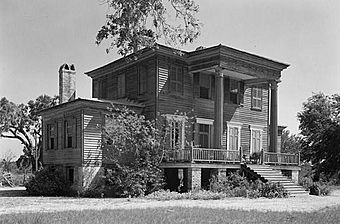Brookland Plantation facts for kids
Quick facts for kids |
|
|
Brooklands Plantation
|
|
 |
|
| Location | 2328 Laurel Hill Road |
|---|---|
| Area | 59.62 acres (24.13 ha) |
| Built | 1803 |
| Architect | Robert Mills |
| Architectural style | Greek Revival |
| NRHP reference No. | 86003198 |
Brookland Plantation is a historic property on Edisto Island, South Carolina. It was once a large farm where enslaved people were forced to work. The plantation is located along Shingle Creek.
Contents
A Look Back in Time
Brookland Plantation has been on Edisto Island since at least the late 1700s. Joseph and Martha Jenkins lived there then, and they are buried on the property. The main house you see today was built later. It was made mostly from strong black cypress wood. Later, extra sections were added to the sides of the house.
Long ago, small cabins for the enslaved people stood among the large oak trees. These cabins are no longer there.
Building the Main House
Historians are not completely sure when the main house was built. Some think it was constructed between 1800 and 1807. Others, like Samuel G. Stoney, believe it was built around the 1840s. A famous architect named Robert Mills might have designed the house.
Around 1800, Ephriam Mikell Seabrook became the owner of the land. He used it as a cotton farm before the American Civil War. His son, Henry Seabrook, later inherited the plantation. However, Henry lost the property in 1872 because of unpaid taxes. H.E. Young and James Lowndes bought the 300-acre property for $471.
Changes Over the Years
In 1928, Mary P. Bailey bought the house. She added a metal roof over the original wooden shingles.
A big change happened in 1958 when Rev. Ralph Wentling bought the plantation. He turned it into a special place called Brooklands Home for Boys. An old school bell from that time is still in the back garden.
In 1968, Dr. and C.C. Wannamaker bought the house. The Brooklands Home for Boys then moved to Orangeburg County, South Carolina. It later became part of the Connie Maxwell Children's Home in 1993.
Recent History
Later, Robert Chesnut bought the house from Dr. Wannamaker. In 2006, Thomas Ravenel, who was once a state treasurer in South Carolina, bought the house. He wanted to protect the property from being divided into smaller pieces. The house was listed for sale again in June 2019.
Images for kids
 | Sharif Bey |
 | Hale Woodruff |
 | Richmond Barthé |
 | Purvis Young |




